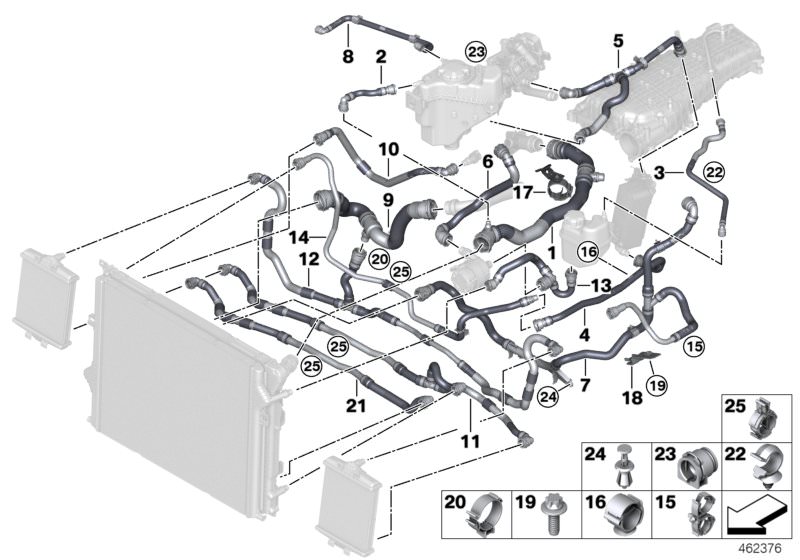I saw a Wagoneer yesterday here in town, first I've seen in nature. VERY good looking vehicle. I believe it was the standard/short/whatever version as it didn't look abnormally stretched and misshapen. I'd drive one any time.
You are using an out of date browser. It may not display this or other websites correctly.
You should upgrade or use an alternative browser.
You should upgrade or use an alternative browser.
Test drove a Jeep Grand Wagoneer with the high output 3.0L twin turbo
- Thread starter wwillson
- Start date
- Status
- Not open for further replies.
4WD
$50 site donor 2024
Sounds familiarThe Wagoneer probably just has the same brakes as the DT RAM, which is the platform it shares. They are pretty good sized for OE, unlike some of the baby brakes you see on certain pickup trucks, which look ridiculous with 22" rims and a brake setup that looks like it was sized for a Neon.
(P275 is the new P265)
I think the Jeep designers have been killing it lately. Some of the best looking vehicles out there.I saw a Wagoneer yesterday here in town, first I've seen in nature. VERY good looking vehicle. I believe it was the standard/short/whatever version as it didn't look abnormally stretched and misshapen. I'd drive one any time.
4WD
$50 site donor 2024
I think the Jeep designers have been killing it lately. Some of the best looking vehicles out there.
GON
$100 Site Donor 2024
Especially the red tow hook Jeep designers started- that wacky trend is being incorporated by other manufacturers. Beats me- but I must be showing my age.I think the Jeep designers have been killing it lately. Some of the best looking vehicles out there.
4WD
$50 site donor 2024
It’s most likely a human performance thing - harder to get wrong and tear up weak bumpers - some are mostly plastic …Especially the red tow hook Jeep designers started- that wacky trend is being incorporated by other manufacturers. Beats me- but I must be showing my age.
"Lately" being defined as Grand Cherokee and Wagoneers...lol. Yeah, the Gladiator is busted.
4WD
$50 site donor 2024
I know - it took me two years to like the Silverado - but still can’t get there on Gladiator - and my DD is a Wrangler"Lately" being defined as Grand Cherokee and Wagoneers...lol. Yeah, the Gladiator is busted.
Great driving vehicles. Driven a bunch of them. Feels like driving a super nice dt ram. Which obviously it is the same platform. That HO version of the 3 liter is great. Love it. Haven’t worked on it yet though so hard to view from that aspect.
I was at enterprise waiting on a car one day for myself and there was a couple that was getting a full size Lux SUV and the agent recommended the Wagoneer over the Yukon said it was much nicer
But no complaints from 6.4 vs 3.0 HO. The turbo one drives better and is quieter. Probably gets more MPGs in the real world too
Not sure why going i6 seems to be an issue to some. The B58 and S58 bmw engines are amazing. Yes in smaller vehicles
I was at enterprise waiting on a car one day for myself and there was a couple that was getting a full size Lux SUV and the agent recommended the Wagoneer over the Yukon said it was much nicer
But no complaints from 6.4 vs 3.0 HO. The turbo one drives better and is quieter. Probably gets more MPGs in the real world too
Not sure why going i6 seems to be an issue to some. The B58 and S58 bmw engines are amazing. Yes in smaller vehicles
Being in quite a few Mopar groups on Facebook, there are A LOT of people who place their masculinity into how many cylinders their vehicle hasNot sure why going i6 seems to be an issue to some. The B58 and S58 bmw engines are amazing. Yes in smaller vehicles
Atmospheric CO2 has never been this high before in at least in the prior 500,000+ years it can be measured. It's not possible to go back 4 billion years but they can go back several hundred thousand years by looking at ice cores from Greenland and Antarctica. I'm not some enviro-dork hippie, I drive a large SUV that gets 15.5 mpg, but it's hard to deny how high the CO2 is in the atmosphere. Yes there's been lots of D-O cycles in the past where the climate changed in a relatively short period of time. There's been ice ages, and then there's been ages where the sea was several hundred feet high than it is now. None of this happened in an environment where CO2 in the atmosphere is over 400ppm.The earth (being approximately 4 billion years old) has gone through many climate changes waaayyy before we got here. Climate change is not a myth, but assuming we are the sole cause of it is pretty naive.
If you're honest with yourself it's not hard to make the connection between human activity in modern times and this level of atmospheric CO2. If you're not honest with yourself, well, I'd suggest this manifests iteself in other areas of your life as well.
Probably because of the additional complexity* modern turbos require. The B58/S58 have complex dual coolant circuits.Not sure why going i6 seems to be an issue to some. The B58 and S58 bmw engines are amazing. Yes in smaller vehicles
*coolant and oil lines, cooling system for Air/Water Intercooler, turbo plumbing

- Joined
- Dec 16, 2022
- Messages
- 699
Atmospheric CO2 has never been this high before in at least in the prior 500,000+ years it can be measured. It's not possible to go back 4 billion years but they can go back several hundred thousand years by looking at ice cores from Greenland and Antarctica. I'm not some enviro-dork hippie, I drive a large SUV that gets 15.5 mpg, but it's hard to deny how high the CO2 is in the atmosphere. Yes there's been lots of D-O cycles in the past where the climate changed in a relatively short period of time. There's been ice ages, and then there's been ages where the sea was several hundred feet high than it is now. None of this happened in an environment where CO2 in the atmosphere is over 400ppm.
If you're honest with yourself it's not hard to make the connection between human activity in modern times and this level of atmospheric CO2. If you're not honest with yourself, well, I'd suggest this manifests iteself in other areas of your life as well.
I'm not educated enough on this issue to know the truth WRT climate change. But they're still uncovering (say) viking artifacts that were buried for hundreds of years, surely that proves the natural cycling thing.
My biggest issue isn't that we're getting into EV's. My biggest issue is the incorrect view that EV's are in any way better for the planet than ICE's and that somehow its going to have a meaningful effect on the course our planet is on.
Incorrect based on whom or what? There are leagues of information out there, but where one lies on the subject is often aligned with political orientation, which in turn drives an average individual's media choices. Anti-electrification media often features folks like Mark Mills from Praeger University and also the Manhattan Institute who are alined with and funded by Big Oil. One examination of spurious claims: https://arstechnica.com/science/202...eving-climate-change-to-attacking-renewables/My biggest issue isn't that we're getting into EV's. My biggest issue is the incorrect view that EV's are in any way better for the planet than ICE's and that somehow its going to have a meaningful effect on the course our planet is on.
Anyway....one person I've seen posted here a number of times is Engineering Explained. Here's his take on ICE vs EVs:
No doubt, mining for lithium, cobalt and other rare earths is bad. But so is mining for coal, or drilling for oil, fracking, etc, all of which must be burned, whereas the rare earths can be recycled.
Electric motors are also much more efficent than ICE, leading to an overall decrease in energy usage for propulsion, regardless of how that energy is produced. Yes, we all know the battery density is not there to do heavy work, but, newer, denser battery chemistries are being worked on all over the world. Range continues to be improved. And safer chemistries are in production for some models - all Tesla Model Y are now LFP (Lithium-Iron-Phosphate) battery powered.
Conversely, we are all seeing the downside of continuous attempts to make ICE vehicles ever more efficient. They are becoming more complex and less reliable. I'm not sure how many comments a week are posted here regarding anti-DI, anti-Turbocharging viewpoints but it's quite a lot.
Nevertheless, despite some of the bans out there, you will continue to have a choice. I know which way I'm leaning, and it's not towards acquring another vehicle that takes motor oil.
wemay
Site Donor 2023
EV definitely has it's problems (infrastructure, cost, range, but...I'm not educated enough on this issue to know the truth WRT climate change. But they're still uncovering (say) viking artifacts that were buried for hundreds of years, surely that proves the natural cycling thing.
My biggest issue isn't that we're getting into EV's. My biggest issue is the incorrect view that EV's are in any way better for the planet than ICE's and that somehow its going to have a meaningful effect on the course our planet is on.
The initial CO2 footprint associated with EV production is dwarfed when compared to the operational CO2 footprint of ICE vehicles.

Comparative life-cycle greenhouse gas emissions of a mid-size BEV and ICE vehicle – Charts – Data & Statistics - IEA
Comparative life-cycle greenhouse gas emissions of a mid-size BEV and ICE vehicle - Chart and data by the International Energy Agency.
Last edited:
OVERKILL
$100 Site Donor 2021
Eh, there are some generous numbers being used in some of these calculations. Yeah, if you are using a CCGT to generate the electricity with a claimed efficiency of 60% or something on the upper end, even with transmission losses, you make out ahead (and natural gas emissions are lower than gas/diesel). However, If you are generating the power using coal, in an old plant, with a thermal efficiency in the 30's, which is similar to the efficiency of an IC engine, and then you factor in transmission losses, not so much.Electric motors are also much more efficent than ICE, leading to an overall decrease in energy usage for propulsion, regardless of how that energy is produced.
I think I did some of the math on this in a previous thread, but let's just say "it's complicated" and tends to be prone to greenwash. Promoting EV's in grids dominated by coal isn't doing much for the environment, on the other hand, doing so in places with clean grids certainly can. Of course then you have the issue of targeted endorsement/promotion, and that can come off as a bit weird.
The pro-ICE arguments tend to be brownwashed, or whatever you want to call it. The folks espousing such views tend to not keep abreast of the latest developments battery/EV/renewable techology advancements.I think I did some of the math on this in a previous thread, but let's just say "it's complicated" and tends to be prone to greenwash. Promoting EV's in grids dominated by coal isn't doing much for the environment, on the other hand, doing so in places with clean grids certainly can. Of course then you have the issue of targeted endorsement/promotion, and that can come off as a bit weird.
The problem I have is with what a lot of people are stating that EVs are considerably worse for the environment than ICE. Old retired ladies on Nextdoor in my area (there is a LARGE 55+ neighbrhood about 10 miles away) blathering on and on about the poor kids in the DRC mining cobalt. And so forth. So many false claims being made.
With regards to your response, if your local electricity company is using 100% coal for generation, it should be an issue for you regardless of what type of vehicle you drive. Where I live on the ERCOT grid, renewables consistently provide 30% of total capacity, even at night when the sun is not shining. This can be easily tracked on ERCOT's website, here: https://www.ercot.com/gridmktinfo/dashboards/combinedwindandsolar
OVERKILL
$100 Site Donor 2021
I got into some of this in this thread:The pro-ICE arguments tend to be brownwashed, or whatever you want to call it. The folks espousing such views tend to not keep abreast of the latest developments battery/EV/renewable techology advancements.
The problem I have is with what a lot of people are stating that EVs are considerably worse for the environment than ICE. Old retired ladies on Nextdoor in my area (there is a LARGE 55+ neighbrhood about 10 miles away) blathering on and on about the poor kids in the DRC mining cobalt. And so forth. So many false claims being made.
With regards to your response, if your local electricity company is using 100% coal for generation, it should be an issue for you regardless of what type of vehicle you drive. Where I live on the ERCOT grid, renewables consistently provide 30% of total capacity, even at night when the sun is not shining. This can be easily tracked on ERCOT's website, here: https://www.ercot.com/gridmktinfo/dashboards/combinedwindandsolar
EV Cradle to Grave emissions
The Union of Concerned Scientists produced a report back in 2015 (attached) that analyzes the cradle to grave emissions of EV's, something that isn't new, there have been a ton of reports produced that delve into what mileage payback for initial manufacturing (which has a notably higher...
bobistheoilguy.com
ERCOT average emissions intensity can be monitored here:

Live 24/7 CO₂ emissions of electricity consumption
Electricity Maps is a live 24/7 visualization of where your electricity comes from and how much CO2 was emitted to produce it.
So, for example, right now, it's 423gCO2/kWh. The average for 2022 was 408gCO2/kWh. Using the UCS figures (we get into that a bit in the thread I linked), ERCOT was, at the time of the paper, 52mpg equivalent.
Also, yesterday, you were not 30% renewables, you were 19%, and it was 17% on the 3rd. Average for the month of June was 27%, so no, they don't consistently provide 30% of your capacity, though they do on average (31% for 2022) because of higher output in the cooler months (March was 41%).
Some of the states in the linked thread, have Mpg equivalents in the 30's, which can be matched by many gasoline cars currently on the road. That's where I was going with my comment on coal. If we look at the WPNA for October for example:
That's a lot of coal! And their average emissions intensity is almost double that of the ERCOT at 769gCO2/kWh in 2022. The MISO is also worse than ERCOT at 529gCO2/kWh, with its largest single source being coal in 2022.
Last edited:
Yes, I meant more on a long-term scale. Obviously it varies as does the wind. When we reach towards the peaks as we have recently, it tends to be a lesser percentage, as most/all available hydrocarbon generating capacity is brought online. Temperatures are a bit cooler relatively speaking today, it has been consistently 104-106 in my area for the last 2-3 weeks, today is "only" 100.
Or for our non-US posters, it has been consistently 40-41C the last 2-3 weeks, today is "only" 38C here.
Or for our non-US posters, it has been consistently 40-41C the last 2-3 weeks, today is "only" 38C here.
OVERKILL
$100 Site Donor 2021
Your high percentage of gas does a good job in bringing down average emissions intensity (when compared to coal). I did provide a couple of coal examples, not sure if you saw my edit.Yes, I meant more on a long-term scale. Obviously it varies as does the wind. When we reach towards the peaks as we have recently, it tends to be a lesser percentage, as most/all available hydrocarbon generating capacity is brought online. Temperatures are a bit cooler relatively speaking today, it has been consistently 104-106 in my area for the last 2-3 weeks, today is "only" 100.
One can use the calculations they've done in that paper to do Mpg equivalents for specific areas, but the broader point was simply that the emissions intensity of your grid is going to be the primary driver of how "green" an EV is in your area when compared to a gasoline or diesel vehicle, and there are a lot of locations where a fuel efficient gasoline vehicle is going to be very similar in overall emissions due to the generation supply mix unfortunately.
- Status
- Not open for further replies.
Similar threads
- Replies
- 42
- Views
- 3K
